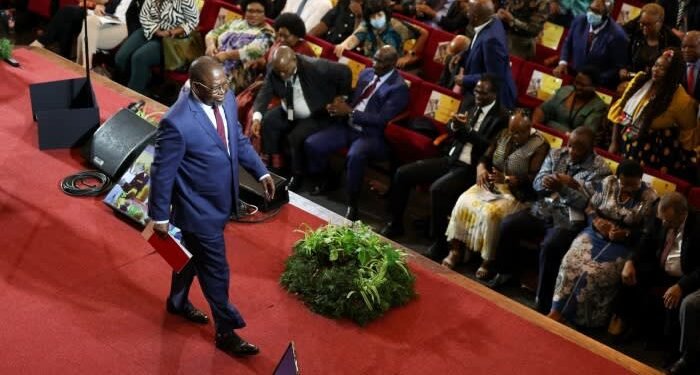Unlock the Editor’s Digest for free
Roula Khalaf, Editor of the FT, selects her favourite stories in this weekly newsletter.
South Africa is to transfer the equivalent of $8bn from a foreign currency account at the central bank to pay down government debt ahead of the most closely fought elections since 1994.
Enoch Godongwana, the finance minister, said the government would transfer R150bn of a state account that has swollen to R507bn — about 7 per cent of the GDP of Africa’s most industrial economy — as the rand has dropped against the dollar and other currencies in recent years.
Investors had been pushing President Cyril Ramaphosa’s government to use the account to lessen reliance on government borrowing that has grown more costly as global interest rates have risen in recent years and South Africa’s economy has stagnated.
His African National Congress heads into general elections on May 29 with public finances strained by weak growth and a shortfall in revenue due to the impact of rolling blackouts and blockages at South African ports on miners and businesses.
Godongwana said tapping into the fund over the next three years would allow the country to slash the amount it spends on servicing debt — which takes up a fifth of tax revenue.
The transfers will come with conditions to ensure “sufficient buffers are available to absorb exchange rate swings and the solvency of the Reserve Bank is not compromised”, Godongwana said.
South African government debt is set to stabilise at 75 per cent of GDP by 2026, in part thanks to the transfers from the account, added the finance minister
“We have done as much as the fiscal envelope allows,” he said in a speech in parliament announcing the measures as part of the budget.
The general election comes amid dissatisfaction with the ANC’s handling of the economy over decades, with opinion polls projecting that the party could fall below a 50 per cent majority for the first time since the end of apartheid in 1994.
South Africa’s National Treasury also lowered the 2023 growth forecast in the budget to just 0.6 per cent, as it tries to contain bailouts for the troubled Eskom and Transnet state monopolies at the heart of the crisis.
“Using these reserves makes treasury’s funding strategy significantly easier,” said Adam Furlan, a debt portfolio manager at the Cape Town-based asset manager Ninety One. “Had they not utilised this, meeting the funding requirements would have been challenging in the coming year.”
Furlan said the move was not a “fix” to the bigger problems required to reduce South Africa’s debt, particularly the low growth thanks to record Eskom power cuts of 280 days last year, and bottlenecks at Transnet ports.
Sanisha Packirisamy, an economist at the Johannesburg-based Momentum Investments, said the Ramaphosa government had dug its “heels in the sand” by resisting giving more money to Eskom and Transnet.
The rand strengthened to R18.77 to the dollar at one point, from below R19 the day before.
Dion George, shadow finance minister from the opposition Democratic Alliance, called the budget a “desperate bailout measure” of a “panicking ANC government that has no plan to accelerate economic growth, resolve relentless blackouts, stabilise debt [or] rein in runaway expenditure”.
Peter Attard Montalto, managing director at South African research group Krutham, said: “There are still deep problems on the ground, both in terms of what’s happening in the labour market and the fact that money isn’t being spent on improving the economy as it should be. These aren’t things that are in the Treasury’s control, but it does illustrate the gap.”
This article has been corrected to make clear that the 0.6 per cent growth forecast is for 2023, not this year as originally stated









